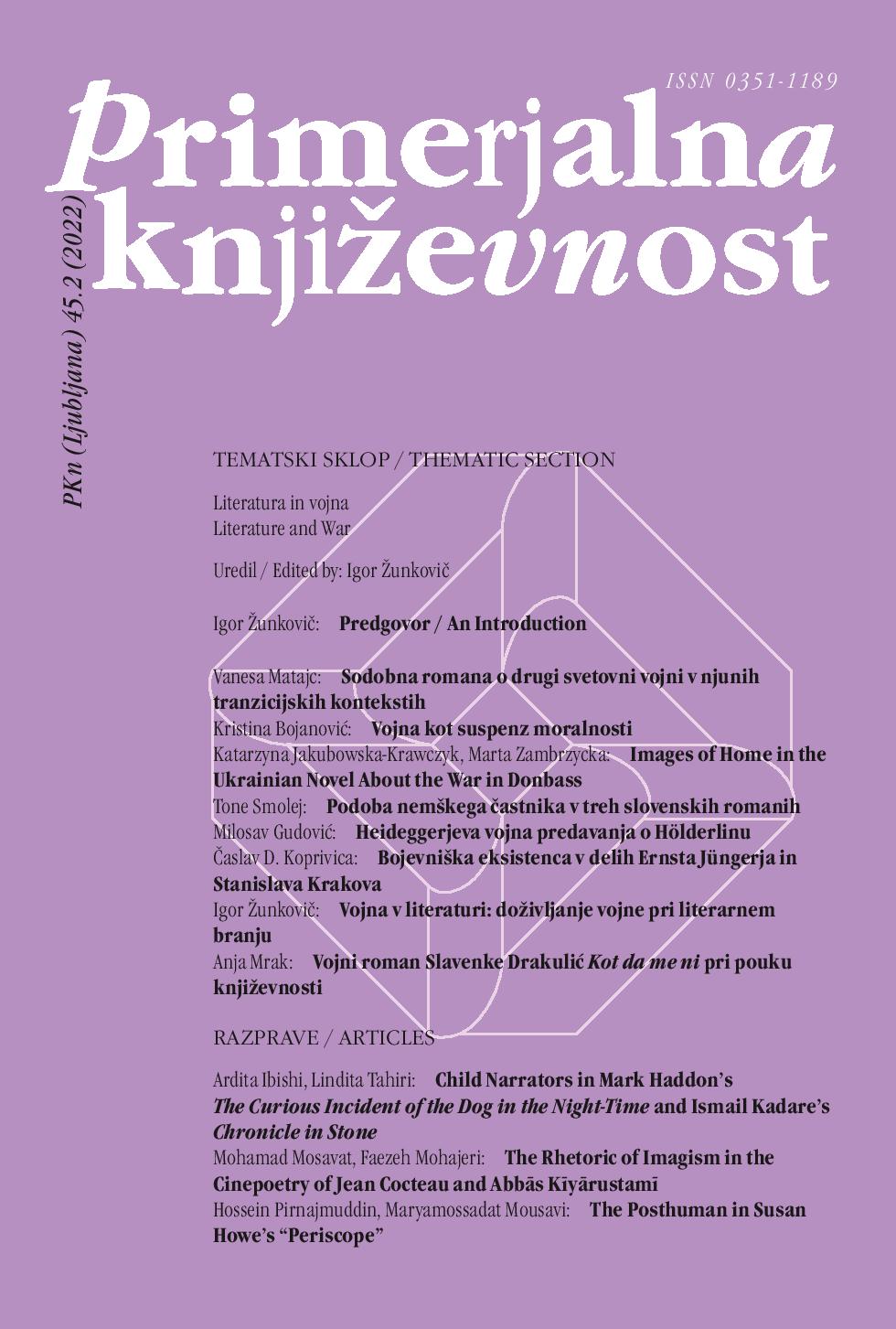“Mackerel and Porpoise / Was This the Last of Us”: The Posthuman in Susan Howe’s “Periscope”
DOI:
https://doi.org/10.3986/pkn.v45.i2.11Keywords:
American poetry, Howe, Susan, nomadic subjectivity, posthumanism, othernessAbstract
This article reads Susan Howe’s poem “Periscope” (2017) to examine how it challenges liberal humanist strands of thinking about the supposed centrality and privileged position of humans while opening up new ways of representing humans vis-a-vis the non-human. Drawing on Rosi Braidotti’s concepts of “nomadic subjectivity,” “figuration,” and “transversality,” Bill Brown’s “Thing Theory,” and Pieter Vermeulen’s “Posthuman Affect,” the study looks into how the poet’s preoccupation with the agency of the other-than-human species depicted in the poem leads to a posthumanist interpretation. It also examines how the narrator questions the boundaries between human and non-human, animate and inanimate in order to evoke uncanny effects that are best realized in the form of post-human defiant challenges to liberal humanist models of subjectivity. The poet, it is argued, creates a suggestive visionary engagement and encounter with the natural world and “anthropomorphized things” in an attempt to awaken historical consciousness to give voice to the non-articulated Other.
References
Austin, William. <em>Peter Rugg, the Missing Man</em>. Worcester: Franklin P. Rice, 1882.
Axelrod, Steven Gould, Camille Roman, and Thomas Travisano, eds. <em>Postmodernisms, 1950–Present</em>. Vol. 3 of <em>The New Anthology of American Poetry</em>. New Brunswick, NJ; London: Rutgers University Press, 2012.
Bartlett, Lee. “What Is ‘Language Poetry’?” <em>Critical Inquiry</em> 12.4 (1986): 741–752.
Beckett, Tom. “The Difficulties Interview.” Interview with Susan Howe. <em>Difficulties</em> 3.2 (1989): 17–27.
Braidotti, Rosi. “Animals, Anomalies, and Inorganic Others: De-oedipalizing the Animal Other.” <em>PMLA</em> 124.2 (2009): 526–532.
Braidotti, Rosi. <em>The Posthuman</em>. Cambridge: Polity Press, 2013.
Brown, Bill. “Thing Theory.” <em>Critical Inquiry</em> 28.1 (2001): 1–22.
Chiasson, Dan. “Susan Howe’s Patchwork Poems.” <em>The New Yorker</em>, 7 and 14 Aug. 2017. Web. https://www.newyorker.com/magazine/2017/08/07/susan-howes-patchwork-poems.
Colebrook, Claire. <em>Gilles Deleuze</em>. London: Routledge, 2002.
Corner, Jason L. <em>Monstrous Compounds: Genre and Value in Herman Melville</em>. Doctoral dissertation. Columbus, OH: The Ohio State University, 2006.
Daly, Kathleen N. <em>Greek and Roman Mythology A to Z</em>. 3rd ed. Revised by Marian Rengel. New York, NY: Chelsea House, 2009.
Davies, Tony. <em>Humanism</em>. London: Routledge, 1997.
Davis, Colin. “<em>État Présent</em>: Hauntology, Spectres and Phantoms.” <em>The Spectralities Reader: Ghosts and Haunting in Contemporary Cultural Theory</em>. Eds. María del Pilar Blanco and Esther Peeren. New York, NY: Bloomsbury, 2013. 53–60.
de Mylius, Johan. “‘Our Time Is the Time of the Fairy Tale’: Hans Christian Andersen Between Traditional Craft and Literary Modernism.” <em>Marvels & Tales</em> 20.2 (2006): 166–178.
Fukuyama, Francis. <em>Our Posthuman Future: Consequences of the Biotechnology Revolution</em>. New York, NY: Farrar, Straus and Giroux, 2002.
Halberstam, Judith, and Ira Livingstone. “Introduction: Posthuman Bodies.” <em>Posthuman Bodies</em>. Eds. Judith Halberstam and Ira Livingston. Bloomington; Indianapolis, IN: Indiana University Press, 1995. 1–19.
Hammer, Langdon. “Inside & Underneath Words.” Review of <em>Debths</em> by Susan Howe. <em>The New York Review of Books</em>, 28 Sept. 2017. Web. http://www.nybooks.com/articles/2017/09/28/susan-howe-inside-underneath-words/.
Hassan, Ihab. “Prometheus as Performer: Toward a Posthumanist Culture?” <em>The Georgia Review</em> 31.4 (1977): 830–850.
Hayles, N. Katherine. <em>How We Became Posthuman: Virtual Bodies in Cybernetics, Literature, and Informatics</em>. Chicago, IL; London: University of Chicago Press, 1999.
Horton, Margy Thomas. <em>Melville’s Unfolding Selves: Identity Formation in Mardi, Moby-Dick, and Pierre</em>. Doctoral dissertation. Waco, TX: Baylor University, 2012.
Howe, Susan. <em>Debths</em>. A New Directions Ebook Original, 2017.
Hutchins, Edwin. <em>Cognition in the Wild</em>. Cambridge, MA: MIT Press, 1995.
Johns, Andreas. <em>Baba Yaga: The Ambiguous Mother and Witch of the Russian Folktale</em>. New York, NY: Peter Lang, 2004.
Kant, Immanuel. “An Answer to the Question: What Is Enlightenment?” <em>What Is Enlightenment? Eighteenth-Century Answers and Twentieth-Century Questions</em>. Ed. and trans. James Schmidt. Berkeley, CA: University of California Press, 1996. 58–64.
Koirala, Saroj. “Linking Words with the World: The Language Poetry Mission.” <em>Tribhuvan University Journal</em> 29.1 (2016): 175–190.
LaBarge, Emily. “A Poet of the Archives: On Susan Howe.” <em>Bookforum</em>, 11 Apr. 2018. Web. https://www.bookforum.com/culture/a-poet-of-the-archives-on-susanhowe-19501.
Lyotard, Jean-François. <em>Postmodern Fables</em>. 1993. Trans. Georges Van Den Abbeele. Minneapolis, MN; London: University of Minnesota Press, 1997.
Messerli, Douglas. “Intertextual Depth in Susan Howe’s <em>Debths</em>.” Review of <em>Debths</em> by Susan Howe. <em>Hyperallergic</em>, 13 Aug. 2017. Web. https://hyperallergic.com/395410/susan-howe-debths-new-directions-2017/.
Montgomery, William. <em>The Poetry of Susan Howe: History, Theology, Authority</em>. New York, NY: Palgrave Macmillan, 2010.
“Notes on the Poem.” <em>Griffin Poetry Prize</em>, 13 Jan. 2019. Web. https://www.griffinpoetryprize.com/from-periscope/.
Packham, Jimmy. “Pip’s Oceanic Voice: Speech and the Sea in <em>Moby-Dick</em>.” <em>The Modern Language Review</em> 112.3 (2017): 567–584.
Pepperell, Robert. “Posthumans and Extended Experience.” <em>Journal of Evolution and Technology</em> 14.1 (2005): 27–41.
Tristan. “Tristan’s Reviews. <em>Debths</em> by Susan Howe.” <em>Goodreads</em>, 5 Aug. 2019. Web. https://www.goodreads.com/review/show/2925055260?book_show_action=true&from_review_page=1.
Vermeulen, Pieter. “Posthuman Affect.” <em>European Journal of English Studies</em> 18.2 (2014): 121–134.
Wolfe, Cary. <em>Animal Rites: American Culture, the Discourses of Species, and Posthumanist Theory</em>. Chicago, IL: University of Chicago Press, 2003.
Wolfe, Cary. <em>What Is Posthumanism?</em> Minneapolis, MN: University of Minnesota Press, 2010.


